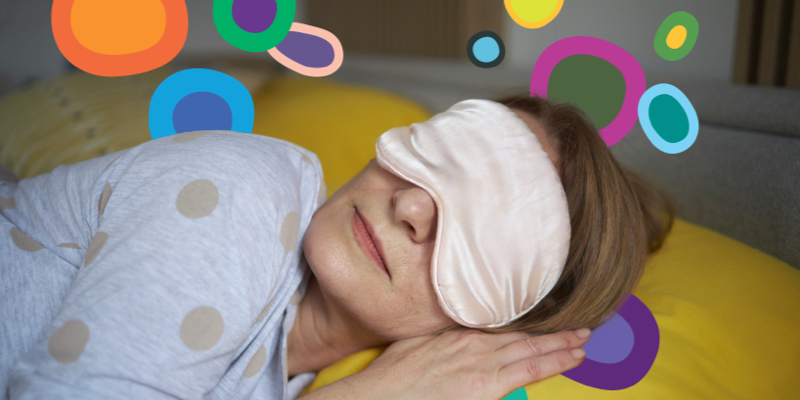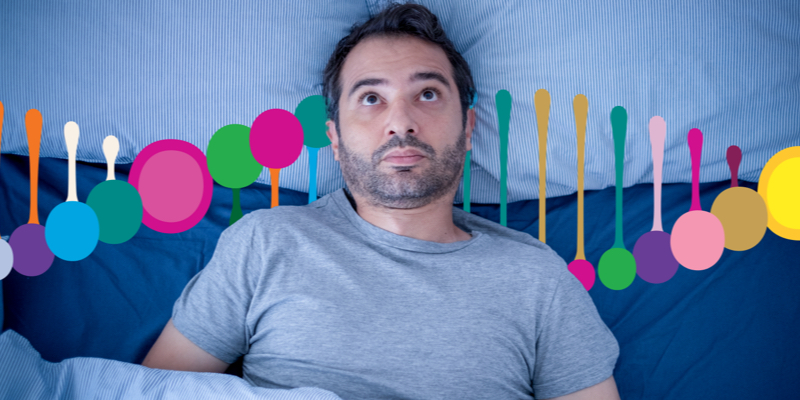
Module 1: Introduction to sleep.
You just close your eyes, right? There’s so much more to sleep than you may think. Learn more about the importance of sleep, how much you need and the health risks associated with poor sleep.

Listen to episode 1: Introduction to sleep
In this episode Dr Chris Robinson, Chief Medical Officer at Medibank talks to Dr Moira Junge, health psychologist and CEO of the Sleep Health Foundation about the importance of sleep and its impact on your health. Read the transcript.
This episode was created in collaboration with the Sleep Health Foundation.
Invest in rest
There’s no denying that sleep is essential for both our physical and mental health. Sleep is so important, in fact, that while we sleep we’re able to do remarkable things like repair the body and refresh the mind. It also helps to regulate our appetite, metabolism and mood as well as our immune, hormonal and cardiovascular functioning.
Our body even has its own internal clock that is tuned by the day-night cycles, known as the circadian rhythm. This makes us feel sleepy at night and awake during the day, all based on chemicals that the brain releases in response to sunlight. Incredible!

Stages of sleep
When we sleep our body doesn’t shut down. Our brains are still active and some parts of the brain use more oxygen and glucose compared to when we’re awake.
Many of us have heard of light sleep, deep sleep and maybe even REM. But do we know what these sleep terms mean? Sleep is made up of different stages: rapid eye movement (REM) sleep and non-rapid eye movement (NREM) sleep. We spend most of our sleep time in the NREM stage – this includes deep sleep where the body’s growth and repair processes happen. REM sleep makes up around a quarter of our total night’s sleep. It’s where the brain shows significant electrical activity and where we experience most of our dreams.
Did you know that REM sleep makes up a larger proportion of total sleep in babies? This suggests that dreams help to mature a developing brain.
How much sleep do I need?
It’s so important to get enough good sleep. And, while most Australians meet national recommendations for how much sleep is needed each night, many still experience sleep problems.1 This brings us to one of the main sleep questions: “How much is enough?”
How much sleep we need varies from person to person, with each of us having slightly different sleep needs to support our overall health and functioning. As we get older, we tend to need less sleep to support our health. As a general rule, children need between 8 and 10 hours of uninterrupted sleep (for ages 14 to 17 years), adults aged 18-64 years need between 7 and 9 hours of sleep and older adults (65+ years) need between 7 and 8 hours of sleep.
What are the consequences of poor sleep?
Research shows that poor sleep increases our risk of developing several conditions, including type 2 diabetes, cardiovascular disease, coronary heart disease, strokes and mental health conditions.1
In addition to the health risks listed above, a lack of sleep can also cause fatigue, concentration issues, mood disturbances, impaired judgment, slower reaction time and poor physical coordination.
Did you know that getting both too little or too much sleep can be problematic and negatively affect our health?
In this day and age – juggling work, friends, family, travel, hobbies, social media and more – sleep is often sacrificed. The good news is that our next article provides helpful insights into commonly reported sleep problems, sleep issues experienced throughout our lifecycle and advice on when to seek support.

Module 2: Common sleep problems and causes
Quit tossing and turning. Get to know the common sleep issues and their causes. Learn about the lifestyle changes you could make which may improve your sleep health and when to seek help.
Things you should know
1 Australian Institute of Health and Welfare; Sleep problems as a risk factor for chronic conditions; retrieved May 2024.
For people who have been diagnosed with a sleep disorder or have any other pre-existing medical conditions, please seek advice from a healthcare professional before participating in this challenge.
If you are experiencing any of the following, please seek advice from a healthcare professional:
• Your sleep issues are persistent and are impacting your mood, everyday activities and overall wellbeing.
• You have excessive daytime sleepiness, restlessness in bed, severe snoring or you’re waking up unrefreshed even with enough sleep time.
• You have a chronic condition and you’re also experiencing issues with your sleep.
• You’re experiencing the symptoms of a sleep disorder – like insomnia, sleep apnoea or restless leg syndrome